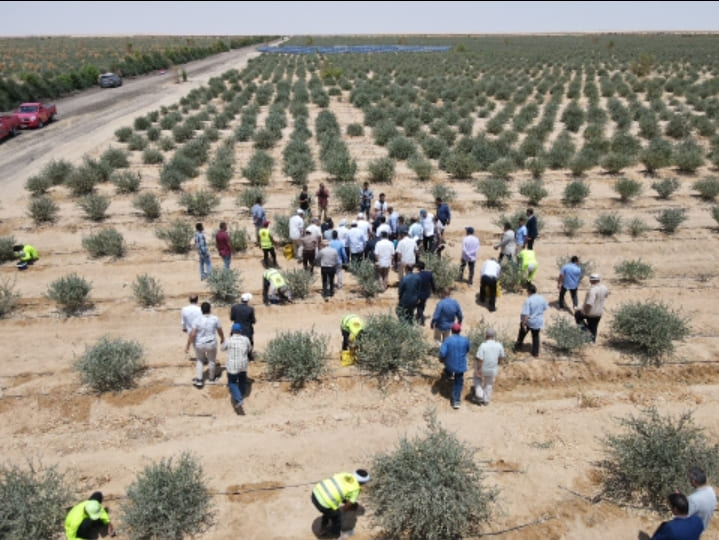The project is located in Wadi Baris, New Valley Governorate. The company is the executor of the Jojoba Valley Initiative and is the largest agricultural developer for jojoba plants. In cooperation with the New Valley Governorate, the initiative covers an area of 50,000 feddans that will be fully planted with jojoba. The first phase of the initiative will cover 15,000 feddans
Key Points:
- Project Location: Wadi Baris, New Valley Governorate, Egypt
- Project Executor: The company responsible for implementing the Jojoba Valley Initiative
- Agricultural Developer: The company, being the largest agricultural developer for jojoba plants, plays a crucial role in the initiative’s success.
- Collaboration: The initiative is undertaken in collaboration with the New Valley Governorate, demonstrating a partnership approach to its development.
- Project Scope: The initiative aims to transform 50,000 feddans (approximately 202,340 acres) into a vast jojoba plantation.
- Phased Implementation: The project will be implemented in phases, with the initial phase focusing on 15,000 feddans (approximately 60,690 acres).
Significance of the Initiative:
The Jojoba Valley Initiative stands as an ambitious undertaking with the potential to bring significant economic, environmental, and social benefits to the New Valley Governorate. By establishing a large-scale jojoba plantation, the initiative aims to:
- Economic Development: Create employment opportunities, generate income for local communities, and diversify the agricultural sector in the region.
- Environmental Enhancement: Utilize jojoba’s drought tolerance and soil conservation properties to combat desertification and promote sustainable land management practices.
- Resource Utilization: Employ treated wastewater for irrigation, minimizing reliance on freshwater resources and promoting water conservation.
- Product Diversification: Introduce jojoba cultivation as a new agricultural venture, expanding the range of crops grown in the region and reducing reliance on a limited number of crops.
Phased Implementation Approach:
The phased implementation strategy allows for a structured approach to the project, ensuring that each phase is completed successfully before moving on to the next. This approach also provides opportunities to learn from the initial phases and make adjustments as needed.
Overall, the Jojoba Valley Initiative represents a promising endeavor with the potential to transform the agricultural landscape of the New Valley Governorate. The collaboration between the company, the New Valley Governorate, and local communities will be crucial for its successful implementation and long-term sustainability.
Responsibilities of the Agricultural Developer:
- Planning and Design: Develop comprehensive agricultural plans for the initiative, including site selection, crop selection, planting schedules, irrigation systems, and pest management strategies.
- Technical Expertise: Provide expert guidance on jojoba cultivation practices, including planting techniques, irrigation management, fertilization requirements, weed control, and pest and disease management.
- Implementation and Supervision: Oversee the execution of agricultural activities, including land preparation, seedling procurement, planting, irrigation, fertilization, pest control, and harvesting.
- Monitoring and Evaluation: Continuously monitor crop performance, soil health, and environmental conditions to identify potential issues and make necessary adjustments.
- Research and Innovation: Conduct research and explore innovative techniques to improve jojoba cultivation practices, enhance productivity, and minimize environmental impacts.
Potential Benefits:
- Economic Development: Jojoba cultivation could create employment opportunities, generate income for local communities, and diversify the agricultural sector in the New Valley Governorate.
- Environmental Enhancement: Jojoba’s drought tolerance and soil conservation properties could contribute to combating desertification and promoting sustainable land management practices.
- Resource Utilization: Utilizing treated wastewater for irrigation could minimize reliance on freshwater resources and promote water conservation.
- Product Diversification: Introducing jojoba cultivation as a new agricultural venture could expand the range of crops grown in the region, reducing reliance on a limited number of crops.
Challenges and Considerations:
- Initial Investment: Establishing large-scale jojoba plantations requires significant upfront investment in infrastructure, seedlings, and irrigation systems.
- Market Demand: Ensuring a sustained market for jojoba oil is crucial for the long-term viability of the initiative.
- Technical Expertise: Building local expertise in jojoba cultivation, including planting, irrigation, harvesting, and processing, is essential for the project’s success.
- Environmental Impact: Conducting thorough environmental assessments and implementing sustainable practices are crucial to minimize any potential negative impacts on the ecosystem.
- Community Engagement: Engaging with local communities and addressing their concerns is essential to ensure their support and participation in the initiative.



